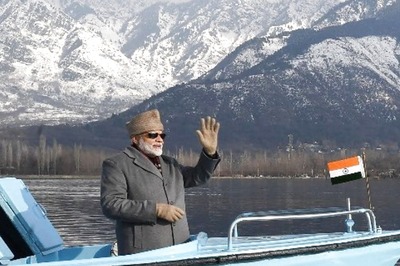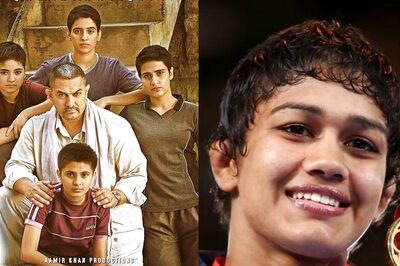
views
Rome/Abottabad: The United States said on Thursday it would stand by its ally Pakistan despite the strains in the relationship exposed by the discovery and killing of Osama bin Laden by US troops close to the Pakistani capital.
"It is not always an easy relationship, you know that," Secretary of State Hillary Clinton said on a visit to Rome.
"But, on the other hand, it is a productive one for both our countries and we are going to continue to cooperate between our governments, our militaries, our law-enforcement agencies, but most importantly between the American and Pakistani people."
Some Americans, including many in Congress, have suggested that Washington attach more strings to the billions of dollars in aid it gives Pakistan, or even cut off Islamabad altogether.
Others say Washington needs Pakistan as a partner to fight al Qaeda and other Islamist militants, as well as to pursue the war in Afghanistan it launched 10 years ago in response to bin Laden's attack on New York and Washington on September 11, 2001.
In the aftermath of bin Laden's death, Clinton said Washington and its allies must continue working with Pakistan to fight Al Qaeda in that country and Afghanistan.
Ahead of a meeting in Rome with European and Arab allies, Clinton defended the decision to kill bin Laden during Monday's raid on his home at Abbottabad, a garrison town near Islamabad.
US accounts of what happened have changed throughout the week, and initial characterizations of a 40-minute gun battle have given way to officials being quoted as saying only one of the five people who were killed had been armed.
Some in Europe and the Muslim world condemn the failure to arrest bin Laden as a breach of international law and have warned that this, as well as the disposal of his body at sea in a move criticized by Islamic clerics, may provoke a backlash.
Clinton said bin Laden had been a clear target for the United States for almost 10 years but his death did not end the battle against terrorism. But she refused to comment on details of the special forces operation in which he was killed, which she watched unfolding on a live video transmission.
"Those were 38 of the most intense minutes," she said.
US officials have sought to keep a lid on growing skepticism over Washington's version of events, insisting that bin Laden was killed during a firefight in the compound.
The White House has cited the "fog of war" as a reason for initial misinformation on whether bin Laden - who was shot in the head - was armed when US Navy Seals stormed into his hideout from helicopters.
Citing US officials, the US television network NBC said four of the five people killed in the operation, including bin Laden himself, were unarmed and never fired a shot - an account that differs from the administration's original assertions that the commandos engaged in a prolonged firefight.
The New York Times quoted administration officials as saying the only shots fired by those in the compound came at the start of the raid, when bin Laden's courier fired from a guesthouse adjacent to the building where the al Qaeda leader was holed up.
US President Barack Obama resisted pressure from aides to release photographs of bin Laden's body, saying the images could incite violence and be used by militants as a propaganda tool.
"I think that, given the graphic nature of these photos, it would create some national security risk," Obama told the CBS program "60 Minutes."
"There's no doubt that bin Laden is dead," Obama added. "And so we don't think that a photograph in and of itself is going to make any difference. There are going be some folks who deny it. The fact of the matter is, you will not see bin Laden walking on this earth again."
Photographs acquired by Reuters and taken about an hour after the assault show three dead men - not including bin Laden - lying in pools of blood. No weapons can be seen in the closely cropped images.
The photos, taken by a Pakistani security official who was in the compound after the raid, show two men dressed in traditional Pakistani garb and one in a T-shirt, blood streaming from their ears, noses and mouths.
"I know for a fact that shots were exchanged during this operation," said one Pentagon official.
Attorney General Eric Holder, dismissing suggestions that killing the unarmed bin Laden was illegal, said the US commandos who raided his hideout had acted in national self-defense.
US Representative Adam Smith, speaking to reporters after a briefing by senior intelligence and defense officials, said the US assault team had come under fire.
"They came in at night. It was dark. There were people moving around. They were fired at by, I think, more than one person," Smith said. "There were weapons in the area. It was a fast-moving situation in which they felt threatened and they responded accordingly."
There has been no sign of mass protests or violent reaction on the streets in Muslim countries, including Pakistan.
However, a major Islamist political party in Pakistan called for mass protests on Friday against what it called a violation of the country's sovereignty after the US raid.
Jamaat-e-Islami (JI) also urged the government to withdraw its support for the US war on militancy.
"We have appealed to everyone to hold peaceful demonstrations on Friday on a very large scale," JI chief Syed Munawar Hasan told Reuters.
Attorney General Holder said bin Laden was a legitimate military target and had made no attempt to surrender to the American forces who stormed his fortified compound near Islamabad and shot him in the head.
"It was justified as an act of national self-defense," Holder told the Senate Judiciary Committee, citing bin Laden's admission of being involved in the September 11, 2001, attacks in the United States that killed nearly 3,000 people.
He said a trove of information seized from the compound would likely lead to more names being added to US terrorism watch-lists.
Pakistan, for its part, faces national embarrassment, a leading Islamabad newspaper said, in explaining how the world's most-wanted man was able to live for years in the military garrison town of Abbottabad, just north of the capital.
The Dawn newspaper compared the latest humiliation with the admission in 2004 that one of the country's top scientists, Abdul Qadeer Khan, had sold its nuclear secrets.
Pakistan has welcomed bin Laden's death, but expressed deep concerns about the raid, which it called an "unauthorized unilateral action."
The country has blamed worldwide intelligence lapses for a failure to detect bin Laden. But Washington is investigating whether its ally had sheltered the al Qaeda leader, which Islamabad vehemently denies.
"There is an intelligence failure of the whole world, not just Pakistan alone," Prime Minister Yusuf Raza Gilani told reporters in Paris on Wednesday.




















Comments
0 comment